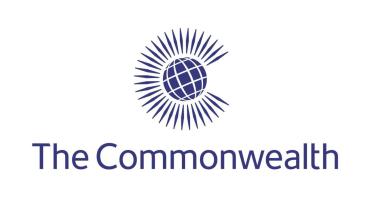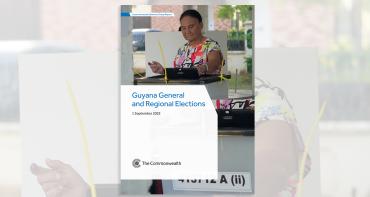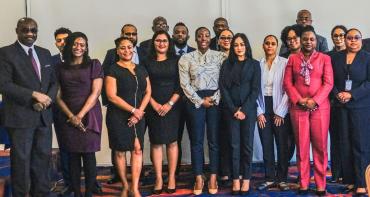“A peaceful Election Day in the evolving electoral system of Lesotho – a maturing democracy.”

Following an invitation from the Government of the Kingdom of Lesotho, the Commonwealth Secretary-General, Mr Kamalesh Sharma, constituted an Observer Group, which has been present in the Kingdom since 19 May 2012. I have been honoured to have been asked to Chair the Group. During our time here, we have met the Independent Electoral Commission, representatives of political parties, civil society, media, the police, the defence force, the diplomatic community as well as other international and national observers.
Over the election period, Commonwealth teams were based in Maseru, Leribe, Mohale’s Hoek, Qacha’s Nek and Thaba-Tseka. Our teams observed the voting, counting and results aggregation and also met with electoral officials, national and international observers and other stakeholders at the District level in order to build a fuller picture regarding the conduct of the process. This is an interim statement and it is issued prior to the formal declaration of election results. We will issue a Final Report containing our conclusions on the entire process at a later stage.
Key findings
- The 26 May Parliamentary Elections in Lesotho were the third elections conducted under the Mixed Member Proportional (MMP) system. We acknowledge the MMP electoral system is still evolving in Lesotho. We note the changes made after the 2007 elections, to address some of the shortcomings. As Lesotho consolidates its democracy, no doubt further adjustments to the electoral model may be necessary.
- Election Day proceeded in a peaceful and calm manner. In addition to the participation of older voters, we were particularly impressed by the large numbers of women and youth who participated in the electoral process, not only as voters, but also as polling staff and party agents.
- The elections were competitive, and basic freedoms of association, assembly and movement were not compromised. We laud the spirit in which all 18 political parties which contested these elections signed an electoral pledge on 27 April 2012, committing them to honour the Constitution and laws of Lesotho; to observe the Electoral Code of Conduct; and to accept the outcome of the 2012 Elections.
- The election campaign was generally peaceful. However, a small number of isolated incidents were brought to our attention, but nothing organised and persistent. In a robust campaign, some challenging of candidates is to be expected and its rare appearance did not create a sense that parties’ campaigns were being extensively disrupted. Some parties also raised a small number of issues with us, the most significant of which pertained to the state of the voter register, the use of government vehicles for election purposes other than for transporting ministers and breaches of the Electoral Code of Conduct. We will bring these matters to the attention of the IEC, so that they can be resolved before the next election.
- We were also alerted by many of the parties we consulted to a statement made by the Commander of the Defence Force, informing voters of his call for the peaceful conduct of elections. While we do not question the motives of the Defence Force, it is our view that the tenor of the press statement raised some concern. Another matter raised with us related to the effective management of the post-election transition process. As Chairperson of the Commonwealth Observer Group, I was sufficiently concerned about these matters, that I undertook proactively to speak not only to political parties and civil society organisations, but also to the Defence Force and the police about these concerns. They assured us of their intention to do everything to make the elections peaceful.
- As Chairperson, I was also proactive in having discussions with leaders of political parties about the post-election transition phase. I was made aware that the current Constitution needs some refinement to address this point. I was assured that all stakeholders agreed to conduct themselves in the spirit of the Constitution and for the good of the people of Lesotho. We took these assurances as a good gesture, conveyed in good faith and a firm demonstration of the commitment of all stakeholders to democracy. We are pleased to note that, up to this point, our call - along with that of our fellow international observer missions -has been heeded.
- I am aware of the support of the Christian Council of Lesotho for the Electoral Code of Conduct. They have similar concerns to us regarding the transitional arrangements and had met the leaders of all political parties to encourage them to ensure a smooth transition. I also met with the Council and commend them for their work in this area.
- It is not uncommon for media in any election to be accused of bias. Most of the stakeholders we met noted an improvement in media coverage for this campaign, compared to previous elections. One main complaint, though, was that the state media—the Lesotho Broadcasting Services (both radio and television) did not offer equal airtime to all the political parties that participated in these elections, but instead devoted a disproportionate level of coverage to the incumbent ruling party. This was contrary to the requirements of the Electoral Code of Conduct. In contrast, private media devoted much of their attention to opposition parties. The media devoted substantial space and airtime to issues raised by candidates and their parties. The print media were particularly robust in reporting the issues. We commend the role played by the Media Institute for Southern Africa, Lesotho Chapter for organising training workshops for journalists on how to responsibly cover the elections, as well as carrying out media monitoring, although more work needs to be done on training in this area.
- We would like to commend the Independent Electoral Commission of Lesotho on its management of the entire electoral process, in particular the logistics of Election Day. We were advised of the extensive efforts of the IEC on voter education, including its door-to-door strategy. We saw the benefits of this in our observations of voting processes on Election Day.
- Every good election starts with a reliable voter register. The integrity of the current voter register remains a concern to us. Despite the laudable efforts of the IEC to produce a clean and reliable register, more work needs to be done to improve it prior to the next election. We sought, and received, assurances from the IEC, that there was little chance of double voting. In our observation of Election Day, there were only a handful of voters who turned up to vote and could not cast their vote for any reason.
- We understand that the voter register serves several purposes, including the delimitation of electoral boundaries, identifying where a voter is registered and as a major tool for party organisers. Given this, it is critical that the IEC give priority to a clean and reliable voter register for the next elections. We believe they now have sufficient experience to further improve the quality of the voter register and remove any doubts concerning its integrity.
- On the day of the election, voting and counting took place in a calm, peaceful atmosphere. We note the enthusiasm of voters to vote, the early arrival at polling centres and the extraordinary lengths to which some had to go to cast their ballot on Election Day.
- The electoral system still poses challenges which the next government will need to address. In its preference for a single vote, in our view the system has introduced some unintended consequences, especially for smaller parties and independent candidates. The major issue arises from the requirement that parties field candidates in constituency seats, to avail themselves of votes for proportional representation seats. It is far more difficult for smaller parties and independent candidates to acquire the financial and other resources to field candidates in more than a handful of seats. It seems to us that the MMP system is designed to ensure parliament reflects the people and the will of the people. This is a challenge for the next parliament of Lesotho.
- The second challenge contained in the current electoral system concerns the ease or difficulty with which citizens can cast their vote. Currently, advance voting is available in special circumstances to a small number of people. We are aware that some people were unable to be in their constituencies on Election Day and therefore could not exercise their franchise. In many other jurisdictions internationally, this problem is addressed by making advance voting available over a longer period. We recommend the next parliament consider this option to ensure voters who will be out of their constituencies on Election Day, can cast their vote easily.
- Commonwealth observers reported that in most areas the voting process proceeded well. We did not identify significant matters that would have materially affected the outcome of these elections. In most instances, the opening and closing of polling stations occurred on time. However, there were a number of matters that would need to be addressed before the next elections. These include the inconsistency in the process in all polling stations, the secrecy of the ballot cast, provision of all materials required in a polling station on Election Day and a reliable, colour version of the voter register in each polling station for any voter to consult.
- We focus on the secrecy of the ballot to ensure that voters place their completed ballots in the ballot box directly, without having to present it to another official for any reason. In our view, the current process risks compromising their secrecy.
- Our teams followed the count at polling stations and the tabulation in a number of Districts. Overall, the procedure of counting was conducted systematically by polling officials. This did slow down the time it took to complete the count and we urge the IEC to look at efficiencies which would make this a quicker process. Further adjustments to current procedures may be required, which we will make recommendations on in our Final Report.
- We were briefed on the Commonwealth-sponsored conciliation and alternative dispute resolution mechanisms that have been a recent addition to the electoral process. We are aware that this system is designed to resolve disputes locally when they occur. We are aware that this is currently being trialed and we look forward to reports on its effectiveness.
Conclusion
- It is the view of the Commonwealth Observer Group that this election was conducted in a credible, transparent and professional manner. We congratulate the people of Lesotho for demonstrating faith in the principles of democracy. Despite the various shortcomings we have highlighted, they did not materially affect the conduct of the elections.
- As the results process reaches its crucial finalisation phase, we hope that the peaceful tenor of the electoral process thus far will continue to prevail. We reiterate our call on all political parties, their supporters and other stakeholders in the Lesotho electoral process to continue to show restraint and magnanimity and to uphold their pre-election commitments to peace with the same spirit of national unity, peace and solidarity. We believe the people of the Kingdom of Lesotho deserve that from their elected representatives.
- The Commonwealth will remain engaged with the people of Lesotho in the journey to consolidate their democracy.
- We continue to follow the process and our Final Report containing our conclusions and recommendations will be made public in a few weeks.
- It was a special honour for me and my team to be in Lesotho at this important time and we thank you for your hospitality. We trust that our work will contribute to the continuance of democracy and good governance in the future.
Maseru, 29 May 2012



